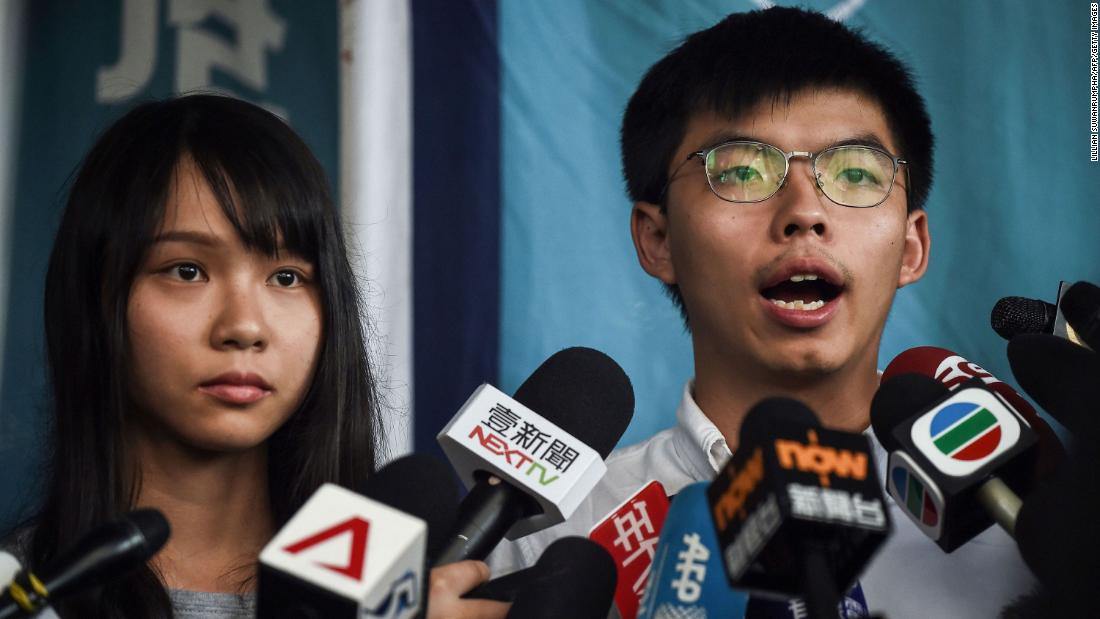
This 13th consecutive weekend of protest follows a week of escalation, including a sudden wave of arrests on Friday of pro-democracy leaders and lawmakers, including youth leaders Joshua Wong and Agnes Chow.
A massive pro-democracy demonstration had originally been planned for Saturday, but was canceled after organizers failed to secure authorization from the police. Scattered incidents during the week also raised concerns about potential violent escalation, after a prominent protest organizer was attacked at a restaurant by masked men carrying baseball bats and knives, and an off-duty policeman was attacked in the street by three men with a knife.
Wildcat protests taking place Saturday in the rally's stead include a Christian prayer march in the city center, a "shopping" protest in the busy Causeway Bay district, and plans to create a "sea of candlelight" across the city Saturday evening. Police have described crowds in the Wan Chai area, where the Christian march had headed, as an "unauthorised assembly."
Streets around the Liaison Office of the Central People's Government, China's de facto embassy to the city, were heavily barricaded as of Saturday morning, with a large police presence.
The week has seen increasing speculation about Beijing's strategy toward the protesters. On Friday, Reuters reported that China had quashed a proposal by Hong Kong chief executive Carrie Lam to entirely withdraw the controversial extradition bill that sparked this summer of protest. Lam has refused to rule out invoking emergency powers.
China recently sent fresh troops to the city, in what it described as a routine rotation at established garrisons in the city. Beijing has stationed troops in Hong Kong since assumed sovereignty over the city in 1997.
On Friday however, one US official told CNN that Washington had no indication that any troops had left the city, suggesting that the week's deployment may have swelled Hong Kong's garrison by the thousands. CNN has reached out to Hong Kong and Chinese authorities for comment.
Also on Friday, US president Donald Trump credited his trade talks with China for "keeping the temperature down" in Hong Kong. "I think if it weren't for the trade talks, Hong Kong would be in much bigger trouble. I think it would've been much more violent," he said. A punishing new round of tariffs will go into effect on Sunday.
Discussing the protests, Trump said, "Look we all want liberty. We all want freedom."
"I think we're going to be worrying a lot -- actually ... I think we're going to be learning a lot in the next two or three days. And I hope that it's handled in a very humane way," he added.
On Saturday morning, Hong Kong's transport systems appeared braced for clashes. The city's subway system closed down one station near the China Liaison Office, which represents the mainland government, and several sections of road on Hong Kong Island were closed to traffic.
Online organizing platform LIHKG also said on Saturday morning that its server had received an unprecedented distributed denial of service (DDoS) attack it said was designed to drive it offline. Another key platform, the encrypted messaging app Telegram, has previously said it was targeted by DDoS attacks, which it linked to the protests.
Almost three months of protests
Hong Kong has been protesting for almost three months, with some demonstrations drawing estimated crowds of over a million.
Protests began in June, sparked by a controversial extradition bill that would have allowed Hong Kong to send suspected criminals to mainland China, where the legal system has a 99% conviction rate. The bill was shelved, though not withdrawn entirely. In the meantime, protester demands have expanded to include calls for its full withdrawal, universal suffrage, and an independent inquiry into police brutality.
Last weekend's protests were among the most violent of the summer, with some protesters armed with metal poles and petrol bombs. Police fired tear gas, water cannons and, in one case, shot a gun into the air. It was the first time that water cannons had been used in these protests.
Police have not revealed the names of all activists arrested in this week's round up. However, they did announce that in addition to Wong and Chow, police also arrested Rick Hui, an outspoken pro-democracy politician, and Andy Chan, founder of the outlawed Hong Kong National Party.
Among other charges, Wong and Chow, both 22, were accused with "inciting others to participating in unlawful assembly" -- which carries a maximum penalty of five years in jail if convicted. They have been released on bail.
Chow described the arrests as an attempt to tamp down on protest participation. "We can see clearly that the regime and the HK government is trying to create a White Terror to try to scare Hong Kong people to not participate in the social and democratic movement of the future," she told reporters outside the courthouse on Friday.
As of Saturday however, there was no sign Hong Kong's protesters had been scared off the streets.
Bagikan Berita Ini














0 Response to "After arrests, thousands take to Hong Kong streets for 13th weekend of protests"
Post a Comment